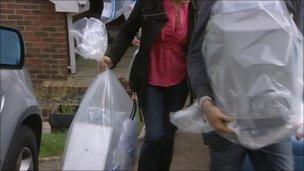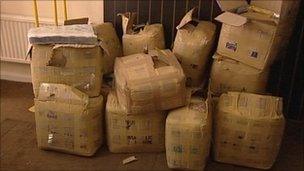Fake medicine trade: UK crackdown on drug importers
- Published
Danny Lee-Frost, from the MHRA says many websites offering prescription drugs are illegal
Investigators are cracking down on the multi-million pound trade in fake and unlicensed medicines, as concerns grow over potential health risks. BBC News joined investigators on one of their raids.
More people are diagnosing their medical problems and buying medicines online - boosting the growing trade in fake and illegitimate drugs supplied without a prescription.
Enforcement agencies warned that those taking the drugs are risking their health, as they launched an international operation to tackle the problem.
The Medicines and Healthcare products Regulation Agency (MHRA) says more than a million doses of medicines worth approximately £2m have been seized from the UK's postal service and ports during its latest crackdown.
An additional 100,000 doses were discovered in raids by police and investigators - with a value of at least £200,000.
'Jackpot'
Valium and Viagra - described by the MHRA as lifestyle drugs - are the most commonly sold.
But the agency warns that the counterfeiters are starting to offer drugs for cancer, heart conditions, epilepsy, asthma and depression.
BBC News joined a dozen MHRA officers as they moved in on an alleged drug-retailing operation in Brighton.
Although the MHRA has discovered a pharmaceutical drugs factory in London, the drugs it seizes are usually manufactured in China or India, so in this raid they are looking for evidence of imported "product".
The investigation begins with intelligence gathered from monitoring a website advertising Kamagra - an Indian version of Viagra not licensed for sale in Britain.
Accompanied by police officers, the team raids an address on a housing estate and arrests one man.
Senior enforcement investigator Danny Lee-Frost says: "No-one involved in those websites is medically qualified. None of the products are licensed or tested.
"They are selling them to you as a drug dealer would, they are not interested in your health, they are interested in taking your money. And the money is big."
The house is searched, documents and computers seized, several safes sliced open with angle-grinders and more than £1,000 in cash discovered - but no drugs.
The investigators switch their focus to paperwork in the house which suggests the owner has been paying rent on a further two storage spaces. A team heads off to the first to investigate.

Importers face prosecution under the Medicines Act
It turns out to be a room in a small office building. Again nothing is found. But upstairs, one of the MHRA's investigators discovers a box, half-full of pills.
They are Valium tablets - quite possibly counterfeit, according to Mr Lee-Frost.
It is a small but useful find for the investigators, meaning the man they arrested can potentially be prosecuted. Pleased with their work so far, they drive over to the other address.
A rundown house in a residential area, it has bars on the windows and a bolted door. Using keys seized earlier, the investigators open the door.
Inside a grubby front room is a pile of boxes containing green tablets in sheets of blister packs.
The pills are Kamagra, according to Mr Lee-Frost. This version of Viagra is popular in India but illegal to sell in the UK - and certainly illegal to supply without a prescription.
The drug is easily distinguishable from legitimate Viagra, which is normally blue. It has been sent from Pakistan.
'Dog urine'
"We have seen some truly horrendous places where products have been stored," says Mr Lee-Frost.
"Residential premises, stuff under the kitchen sink covered in dog urine, rats gnawing at them. They are just commodities."
The haul has a potential value in excess of £100,000 and the person who imported it could be prosecuted under the Misuse of Medicines act.
He could be sued by Pfizer, the owner of the Viagra brand, and is also being investigated for money-laundering.
Importers can break the medicines law in two ways - selling drugs not licensed for the UK and selling fake drugs made abroad, which can contain less active ingredient than they should.

The health risks of fake drugs are hard to quantify, the MHRA says
One haul of a counterfeit cancer drug was tested and found to contain 98% of the active ingredient.
But it was badly manufactured and would not properly dissolve in the body, posing an enormous health risk.
Another trick is to package Viagra as a natural Chinese herbal remedy, designed to enhance sexual performance. It would work, says the MHRA, but Viagra should not be taken without speaking to a doctor.
Nine times in the last three years illegitimate drugs have made it as far as a pharmacy.
The agency finds it extremely hard to quantify the risks. Records are not kept of patients who have suffered the ill-effects of illegal drugs, partly because it is rarely obvious they have been the cause of health problems.
In some ways the biggest threat this market could pose is to the brand names and trademarks of the big pharmaceutical producers.
But the MHRA insists there are health risks - citing a recent survey of GPs suggesting one in four had treated patients made ill by drugs bought online.
Trouble sleeping
Another developing trend is for students to buy a certain drug used to treat the condition narcolepsy.
Roy Lambden: "I don't want another family to go through what we've been through"
It is being bought online by those who want to stay up all night studying.
Last December a young paramedic, Lorna Lambden, was having trouble sleeping after her shifts. She bought an anti-depression drug also used for insomnia.
It is thought she took fewer than four pills, but was found dead. Her father, Roy, told the BBC on Thursday the medicine "stopped her heart".
"You don't realise the dangers of prescription drugs. There's a reason there is a prescription."
He blamed the illegal online pharmacies, and said: "It's no different from selling hard drugs. It's become so easy to buy prescription drugs rather than booking an appointment with a doctor."
"I don't want another family to go through what we've been through. Those drugs are too readily available, it's too easy for people to take them. If people don't buy them those companies will go out of business."
The MHRA's advice is simple: Do not buy anything off the internet without a prescription. Legal internet pharmacies should always ask for one.
- Published9 September 2011
- Published17 December 2010